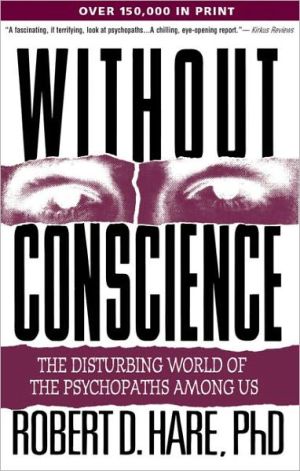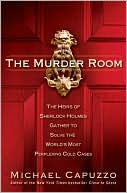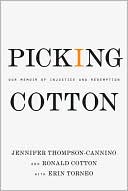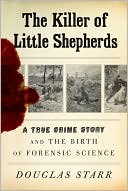Without Conscience: The Disturbing World of the Psychopaths Among Us
Do you know men or women who: live on the edge, often changing jobs, schools, relationships, and homes?; never feel guilt or shame - even when they are caught lying?; act cold and distant one moment and incredibly emotional the next?; lack empathy, and live for the moment without the slightest regard for the welfare of others?; scheme their way into money, power, and relationships? They may be psychopaths, individuals who move through life with supreme self-confidence - but without a...
Search in google:
Most people are both repelled and intrigued by the images of cold-blooded, conscienceless murderers that increasingly populate our movies, television programs, and newspaper headlines. With their flagrant criminal violation of society's rules, serial killers like Ted Bundy and John Wayne Gacy are among the most dramatic examples of the psychopath. Individuals with this personality disorder are fully aware of the consequences of their actions and know the difference between right and wrong, yet they are terrifyingly self-centered, remorseless, and unable to care about the feelings of others. Perhaps most frightening, they often seem completely normal to unsuspecting targets--and they do not always ply their trade by killing. Presenting a compelling portrait of these dangerous men and women based on 25 years of distinguished scientific research, Dr. Robert D. Hare vividly describes a world of con artists, hustlers, rapists, and other predators who charm, lie, and manipulate their way through life. Are psychopaths mad, or simply bad? How can they be recognized? And how can we protect ourselves? This book provides solid information and surprising insights for anyone seeking to understand this devastating condition. Publishers Weekly This work of pop psychology merits attention because Hare has pioneered in the field of psychopathy, which is still in a formative state. Psychopaths, he asserts, are neither sociopaths nor psychotics but rather are people who are well aware of the difference between right and wrong and ignore the distinction. Additionally, they are egocentric and have no feelings of empathy, guilt or remorse. They view others as potential victims, and they leave a trail of unhappiness behind them in those who have succumbed to their deceitful manipulations. Whether nature or nurture underlies their aberration is still uncertain; they are almost impossible to treat, according to Hare, because they are convinced that they have no psychological or emotional problems. Although, as he notes, much of the literature on psychopathy is scientific, Hare here presents material in a form accessible to lay readers. (Nov.)
EpigraphContentsAuthor's NotePreface and AcknowledgmentsIntroduction11"Experiencing" the Psychopath82Focusing the Picture213The Profile: Feelings and Relationships334The Profile: Lifestyle575Internal Controls: The Missing Piece716Crime: The Logical Choice837White-Collar Psychopaths1028Words from an Overcoat Pocket1249Flies in the Web14410The Roots of the Problem15511The Ethics of Labeling18012Can Anything Be Done?19213A Survival Guide207Epilogue219Notes221
\ Publishers Weekly - Publisher's Weekly\ This work of pop psychology merits attention because Hare has pioneered in the field of psychopathy, which is still in a formative state. Psychopaths, he asserts, are neither sociopaths nor psychotics but rather are people who are well aware of the difference between right and wrong and ignore the distinction. Additionally, they are egocentric and have no feelings of empathy, guilt or remorse. They view others as potential victims, and they leave a trail of unhappiness behind them in those who have succumbed to their deceitful manipulations. Whether nature or nurture underlies their aberration is still uncertain; they are almost impossible to treat, according to Hare, because they are convinced that they have no psychological or emotional problems. Although, as he notes, much of the literature on psychopathy is scientific, Hare here presents material in a form accessible to lay readers. (Nov.)\ \ \ \ \ Library JournalThe word psychopath conjures up visions of the horrific deeds of Ted Bundy or Jeffrey Dahmer for most people. But not all murderers are psychopaths and not all psychopaths are murderers. Psychopathy is a complex personality disorder whose most prevalent characteristic is lack of remorse and whose cause and cure are still unknown. Unlike Hare's previous writings, geared to professional clinicians and researchers, this title attempts to clarify psychopathy for the general public. Hare is a recognized expert in the field of psychopathy, and whereas the content here is good and the explanations accessible to lay readers, the presentation is choppy and repetitious. Owing to interest in the more famous psychopaths, this book will probably be popular in public libraries. Although it is by no means scholarly, academic libraries may consider it because of the author's expertise. Another book to consider is Herve Cleckley's classic, The Mask of Insanity (Cleckley, 1988).-- Jennifer Amador, Central State Hosp. Medical Lib., Petersburg, Va.\ \ \ From the Publisher"A fascinating, if terrifying, look at psychopaths. . . . Hare makes a strong case for the view that psychopaths are born, not made. . . . A chilling, eye-opening report—-and a call to action." —-Kirkus\ \








